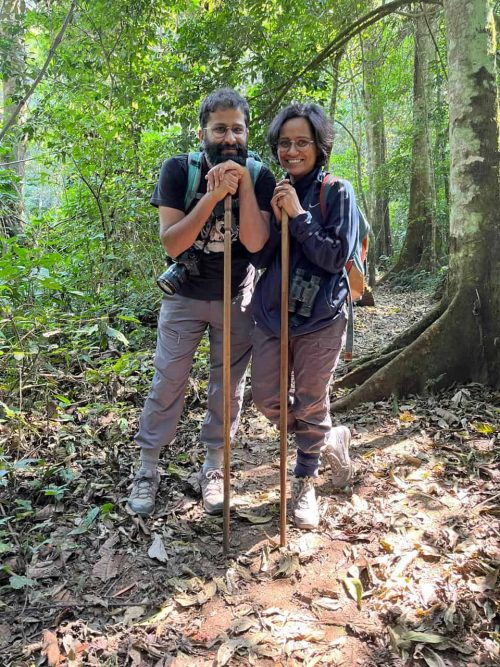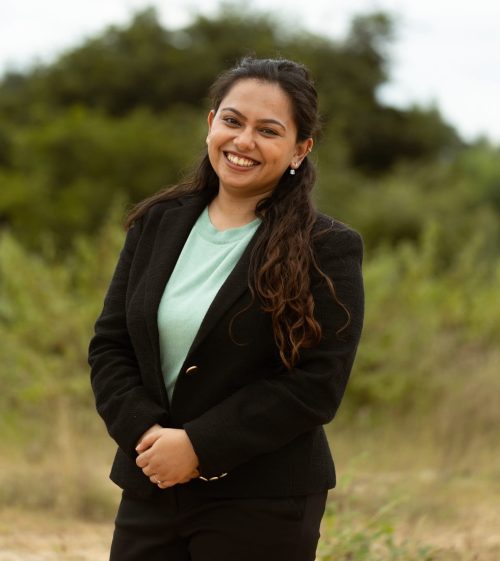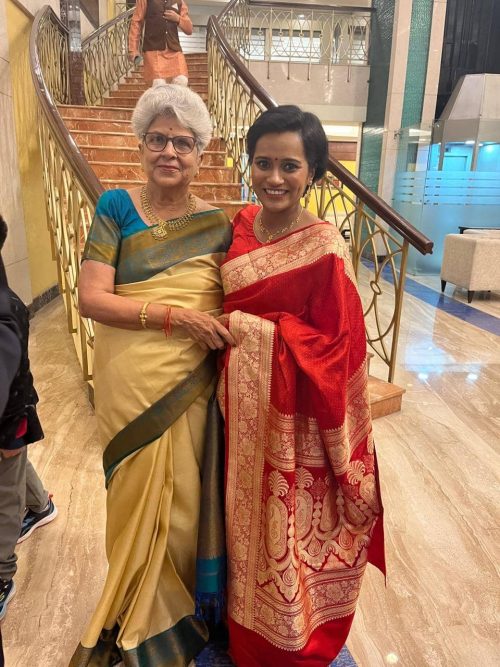Image courtesy: Devleena Chatterjee (L) and Sneha Khedkar (R)
“I had three weeks to live every month. The pain [during menstruation] was so excruciating that I felt like someone was stabbing me from inside and twisting my intestines. Seven doctors just gave me painkillers and told me that they were just painful periods,” says Sneha Khedkar (29).
“The pain was so sharp that it felt like something was completely wrong with my body. I just felt like I was not functioning for 14 days every month,” says Devleena Chatterjee (33).
What unites these two women is their struggle with endometriosis — a disease where tissue similar to the lining of the uterus grows outside of the uterus. Accompanied by debilitating pain every month, it made life difficult to function for these two. What was even more painful though, they share, was the fact that no doctor took them seriously.
Sneha went to over seven doctors over five years in search of a solution or diagnosis for her pain. She was dismissed everywhere and sent with a prescription for painkillers. She suffered from excruciating pain ever since she first got her period at 12. After enduring pain and not having a diagnosis for it for 14 years, she finally found a doctor who validated her pain and told her that it might be endometriosis.
“I cried that day. I finally knew that it was not in my head, and it was not because I had a ‘low tolerance for pain’,” says Sneha.
Devleena too found a solution after enduring pain for over two years. Like many women, she was repeatedly told by doctors, “It’s just period pain; all women go through it. There’s nothing to worry about.” However, having in-laws who were doctors proved to be a blessing. Her mother-in-law believed her and helped guide her to the right specialists.
Today, both women are raising awareness about this condition, which is “notoriously difficult to diagnose”. Endometriosis affects roughly 10 percent of women (over 200 million women) across the globe.
“Don’t let anyone convince you that painkillers are the only solution. Your well-being is worth fighting for,” says Devleena, emphatically.
‘Felt like 1,000 needles were pricking me’
“Endometriosis is a disorder in which endometrial cells (inner lining of the uterus) grow outside the uterus and respond to ovarian hormones, thereby bleeding every month inside the abdomen, forming cysts,” says Dr Vinoad Bharrati, obstetrician and gynaecologist, Rising Medicare Hospital, and director, Elite Momz.
Delhi-based Devleena, a research consultant with a PhD in organisational leadership, policy, and development, had experienced pain-free periods for most of her life. However, about two and a half years ago, she began to suffer from sharp pains before her periods, leaving her unable to function during that time.

Concerned, she spoke with her in-laws, both of whom were doctors, and they connected her with a doctor friend. Initially, the doctor suspected appendicitis but also raised the possibility of endometriosis. He recommended an ultrasound, though diagnosing endometriosis is difficult and often requires surgery for confirmation.
“The gold standard to diagnose endometriosis is a laparoscopy, a minimally invasive surgery in which conditions inside the abdomen can be seen. However, it’s an invasive mode of diagnosis. Clinical observation is crucial based on symptoms. Sonography and MRIs are important tools that aid in diagnosis,” adds Dr Vinod.
In Devleena’s case, the ultrasound ruled out appendicitis initially. “Doctors are hesitant to perform surgery just to check for endometriosis unless it’s absolutely necessary,” she explains. As a result, she was advised to adopt a wait-and-watch approach.
However, a few months later, the pain returned — this time even more unbearable. While she was alone in Bengaluru, Devleena went to the emergency room at a hospital. This time, the ultrasound revealed that her appendix was swollen. “The doctors were confused because they thought that it wasn’t swollen enough to cause the kind of pain I was experiencing. They decided to do an appendectomy (removing the appendix),” she shares, adding, “My mother-in-law, meanwhile, spoke to the surgeon and asked him to check for endometriosis too.”
The doctors missed the endometriotic tissue, which was clearly visible in the ultrasound, misdiagnosing her with appendicitis, rues Devleena. “During the surgery, they touched the endometriotic fluid, which led to it spreading, leading to more problems. I faced massive digestion issues over the next year and a half accompanied by painful periods due to the aspiration during the surgery,” she adds.
This incident led to her popping painkillers every eight hours to manage her pain.
‘Just listen to us; we know our body’
Meanwhile, Bengaluru-based Sneha, a biologist turned science journalist, faced painful periods ever since she got her periods at 12. The days leading up to her periods were horrible for her and affected her life. She had to be brought home from school sometimes as the pain was unmanageable. As she progressed to college, it led to her missing a few days every month.
Unfortunately, as a teenager, she didn’t know that something called endometriosis existed, leading to her just living with it. She first visited a doctor when she was 18, who advised her to take painkillers to manage the pain.
“The first assumption was always that I had a low pain tolerance. It was very frustrating as no one took me seriously. Over time, I wondered if I really couldn’t endure the pain,” she says, adding that working as a research fellow, she had to plan her work around this pain. “I would work for three weeks every month as I couldn’t stand in the lab for a long time before my periods. I scheduled lighter work during the last week.”

When Sneha was about 24-25 years old, she learnt about endometriosis from a friend. A deep research into the disease led to a strong belief that she indeed had endometriosis. All this while, she continued visiting doctors, hoping that they would find a solution for her pain.
The first time a doctor took her seriously, she says, was when her partner accompanied her and stressed that the pain she experienced wasn’t normal. “He insisted on further tests and the doctor agreed to take an MRI. I was undermined all these years despite knowing my body the best. They just had to listen to me; it’s not that difficult right?” she laments.
The MRI confirmed Sneha’s suspicions — she had endometriosis. “I cried that day. I felt robbed of so many life experiences. I wish they had just listened to me when I told them that it wasn’t normal period pain,” she says.
In December 2021, she underwent surgery to check her endometrial tissue. The doctor put her on a hormone treatment; this didn’t work for her, leading to further anxiety. “They closed me up and said that the tissue didn’t warrant so much pain. It messed with my emotional and mental state,” Sneha says.
Unhappy with the treatment and now aware and educated about the condition, she found an endometriosis expert in Mumbai. Another MRI scan revealed that she had a cyst that was pressing down on the ligament behind the uterus, which possibly led to her pain. So in December 2022, she underwent another surgery where these cysts were taken out. A histopathology report also confirmed that she had endometriosis.
After the procedure, life has been much better for Sneha. She no longer has to pop painkillers and is able to lead a normal life. “After a lot of gaslighting and insinuating that I was clamouring for attention, this diagnosis gave me the validation I needed. I wasn’t wrong; I knew my body,” she remarks.
‘Pain is not part of being a woman’
But for Devleena, the complications after the first surgery in February 2023 caused a lot of pain, even more excruciating than before. “Since I had to travel a lot for work, I kept blaming it on water or food,” she says, adding, “It felt like 1,000 needles were pricking me from the inside. The pain was so sharp, I couldn’t stand; I would just collapse. I kept throwing up, feeling anxious and depressed.”
She even consulted another gynaecologist in Delhi who said that it might be endometriosis and asked her to consider taking birth control pills. “Since the doctor didn’t insist much, I didn’t take them as I didn’t want to add another set of pills. I wish she had explained to me how it would help my situation,” says Devleena.

Earlier this year, as the pain intensified, Devleena underwent both a CT and MRI scan, which revealed a large cyst measuring around nine centimetres. This discovery led to another surgery. Not wanting to take any chances, the procedure was performed in Delhi under the supervision of a trusted colleague of her in-laws.
“What was supposed to be a one-hour surgery extended to over five hours due to the liquid spreading across my stomach and digestive system. They also had to remove my ovary,” shares Devleena.
Understanding the full situation and prioritising her health, Devleena’s mother-in-law urged the doctors to remove the ovary during the surgery.
“In most cases, especially with women of childbearing age, doctors usually try to save the ovary, but that can lead to further complications and more surgeries. I come from a very progressive family but I don’t know if most people will take that stand. I know of friends who weren’t even asked if they wanted to have a child. Doctors decided for them and saved the ovary. They had to undergo another surgery later,” Devleena shares.
Women’s agency and their wishes aren’t taken into account, she rues. “Most doctors advise you to have children as it might sort out some issues according to them,” she says
Sneha also chimes in. “I was just 25 and not married. The doctor suggested that I should think of having a child soon.”
Both women have finally found solutions to their pain after years of struggles. Speaking to many other women in the same boat, they say that the consensus remains the same — their pain is not taken seriously.
“This level of pain is not normal. It’s important to have the information to understand what your body is going through. Just knowing that it’s not in my head was hugely empowering,” says Devleena.
“Why is a pain like this normalised?” asks Sneha. “Pain is not a normal physiological process. Pain is not part of being a woman. This whole ‘women need to endure pain’ mentality needs to stop.”
To build a #BetterIndiaForWomen, both women assert that it’s time medical professionals started listening to women. It’s also time women start taking their health seriously. “Just listen and indulge women who come seeking help from you. Hear us out. It’s not in our head,” reiterates Sneha.
“If your pain is bad and not something you’ve experienced before, go to a doctor. Find one who listens to you and don’t give up. Start taking care of yourself and give priority to your own health,” she adds.
Edited by Pranita Bhat

No comments:
Post a Comment